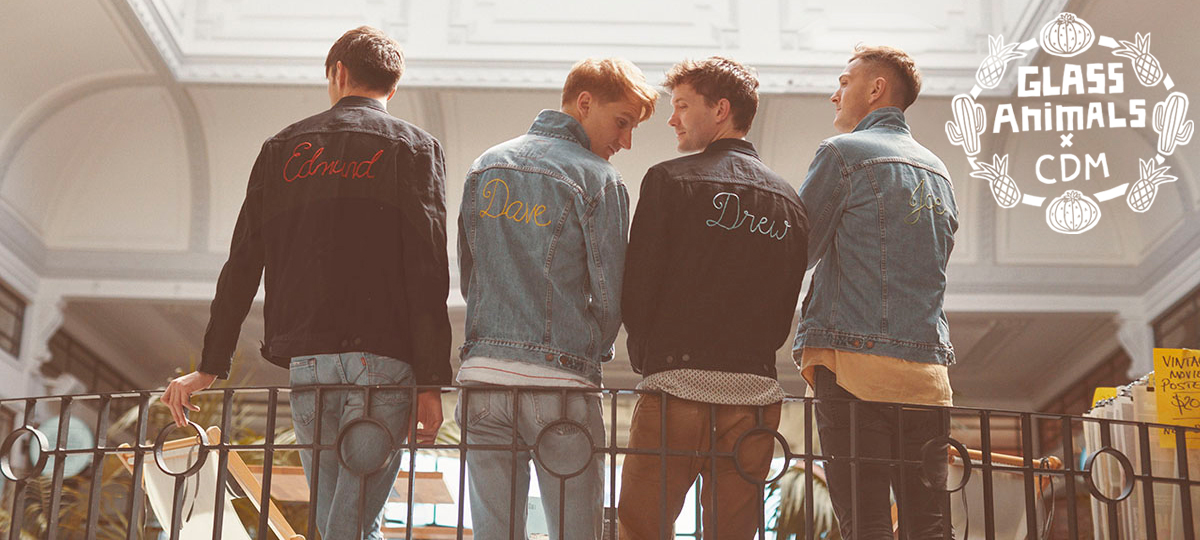
All four members of Oxford band Glass Animals are down on their hands and knees picking confetti and expired confectionary off the floor of an outdoor playground in central Auckland after having batted the insides wide open of a cactus-shaped piñata. Repeatedly, they’ve been asked to cease and desist their clean-up efforts, but they cheerfully ignore all attempts to corral them away to their next photoshoot location and instead joke about the drainage holes of the playground’s anti-slip rubber matting, wryly observing that, "It’s like you picked these jellybeans to perfectly fit inside the circular holes."
It’s becoming more and more obvious with every passing second that Glass Animals are absolutely ridiculous.
Armed with a ridiculously good sophomore album and a ridiculously good live show and ridiculously polite proclivities, it’s absurd that Glass Animals pose the rhetorical dilemma of 'How To Be A Human Being' on their latest album (the title of which, frontman Dave Bayley has said came to him in a dream), when they clearly are already so very rather good at it. I’m not saying that they are literal sunbeams of goodness in a world where asking any other headlining Laneway Festival act to pose for photos by a giant caterpillar could have gone rather poorly, but name me just one other UK band whom their New Zealand publicist has fondly referred to as 'polite gentlemen' in recent times. Go on, I’ll wait.
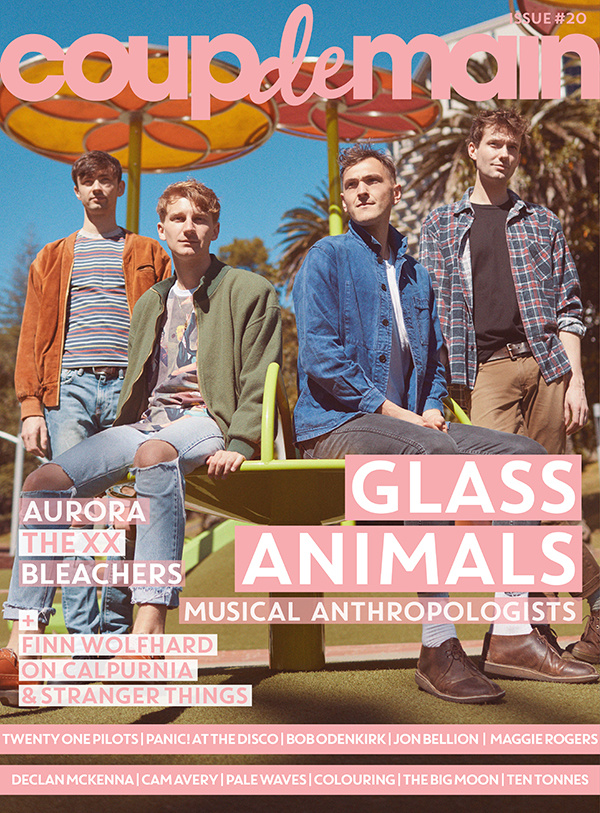
Glass Animals present themselves as musical anthropologists on their latest album - ironically, animals studying humans; a reverse zoo in song-form. Tarot-like tropes, such as trump cards 'The Fool' and 'The Lovers', are characterised by the protagonists of each of the record’s songs, with Bayley empathetically narrating each of their stories to be open to interpretation and the listener free to apply their own meaning. Although lyricist Bayley soundtracks the outlandish tales of characters he created himself after being inspired by conversations with strangers while touring debut album 'Zaba', his words feel oddly familiar, like hand-me-down secrets shared amongst family - the kinds of skeletons that come out to play after too much to drink at an annual Christmas party.
'How To Be A Human Being' is a smorgasbord of mortal sins - from greed ('Cane Shuga'), and pride ('The Other Side Of Paradise'), to lust ('Take A Slice', 'Poplar St'), gluttony ('[Premade Sandwiches]'), and sloth ('Season 2 Episode 3') - thoughtfully brought to life through confessional parables of frank humanity. Every person that’s ever been alive is their own entire world with their own unique ideologies, feelings, communities, and history, and Bayley creates self-referential worlds within worlds for the disparate cast of his album to all coexist within - idiosyncratic contiguous bodies orbiting a technicolour solar system.
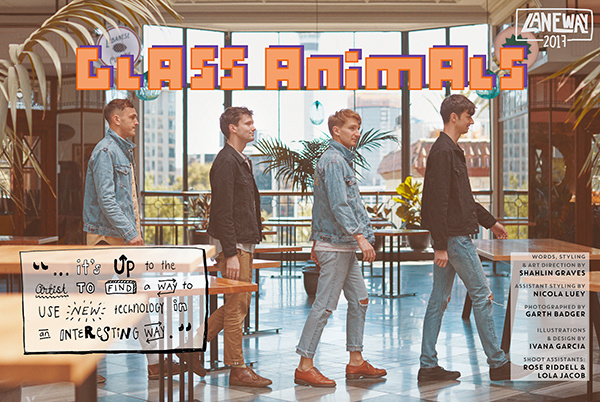
Five days before Glass Animals are scheduled to arrive in New Zealand to play Laneway Festival, I receive an e-mail with the band’s clothing sizes in which guitarist/keyboardist Drew MacFarlane informs me that his head size is "medium-large", his shoe size is an UK 8.6, and that his arms are "long". Unsurprisingly, MacFarlane turns out to be a troll in real-life as well, taking it upon himself to sit on top of the cards of a fellow bandmate during a game of Cards Against Humanity, causing widespread confusion while he reclines, secretly hiding another’s cards and smirking. But like everything MacFarlane does, even when he’s deliberately attempting to trip up his friends when they’re all instructed by a photographer to unitedly pace to and fro, he does it all so very endearingly.
Other important things to know about MacFarlane include that he recently bought a book about sewing so that he can teach himself how to mend holes in his clothes while on tour, he regularly loses his glasses ("Drew's glasses last on average about 3 minutes"), was arrested in America for climbing a road-sign nude, and that he once consented for his naked torso to be slapped with raw salmon as a reward for fans who voted the band into the top 20 of Triple J’s 2015 Hottest 100. If MacFarlane sounds like the kind of human that has to be met to be believed, then that’s probably because he is. Bayley once said in an interview with DIY that, "If an alien were to come from space, and were to watch one human, I’d make sure he watched Drew." MacFarlane has been unanimously agreed upon by rest of the band to be the 'weirdest member', and recently they cautioned against him ever competing in The Grand National, "He would probably take off all his clothes, stick a horn on the horse’s forehead and ride off into a sunset. Hours later, distracted by something shiny, he'd drive the horse off of a cliff and fall to his death."
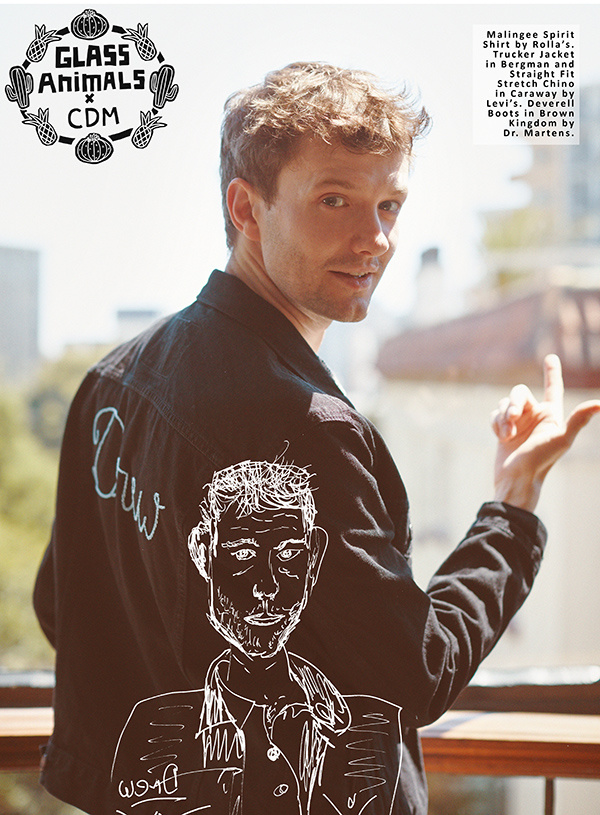
Bassist/keyboardist Edmund Irwin-Singer is quick to offer himself up ("me!") when questioned as to who is the best photographer in Glass Animals. A former choirmate of MacFarlane (they’re both alumni of Cambridge’s Trinity College Choir), he’s repeatedly likened to a meerkat by his fellow band-members (Bayley has told Hunger magazine that Ed is "long and thin and quite entertaining just to watch from a distance"), outed for his love of trains and bird-watching (MacFarlane says, "He has very sharp eyes"), and is impressively keeping himself occupied currently by building a D.I.Y. modular synth from scratch, after having successfully constructed his very own bass amp earlier this year. Who is the real genius in Glass Animals? What is the truth?
You can also count on Irwin-Singer to come to your aid in times of need, as evidenced on two separate occasions during our short acquaintance - the first being him coming to the rescue by heroically hitting with a baseball bat a well-taped piñata that refused to unstick from its hangings to be disposed of ("Don’t worry guys, I’ll do it"), and the second being an incomparable show of chivalry during which he lightly jogged ahead of all in the interview’s party to hold a door open for everyone. And it’s not just humans that Ed is friendly towards, but also man’s best friend, as he and MacFarlane are spotted later in the day on a drive to the backstage entrance of Laneway Festival happily waving to a German Shorthaired Pointer dog in the passenger seat of a neighbouring car.
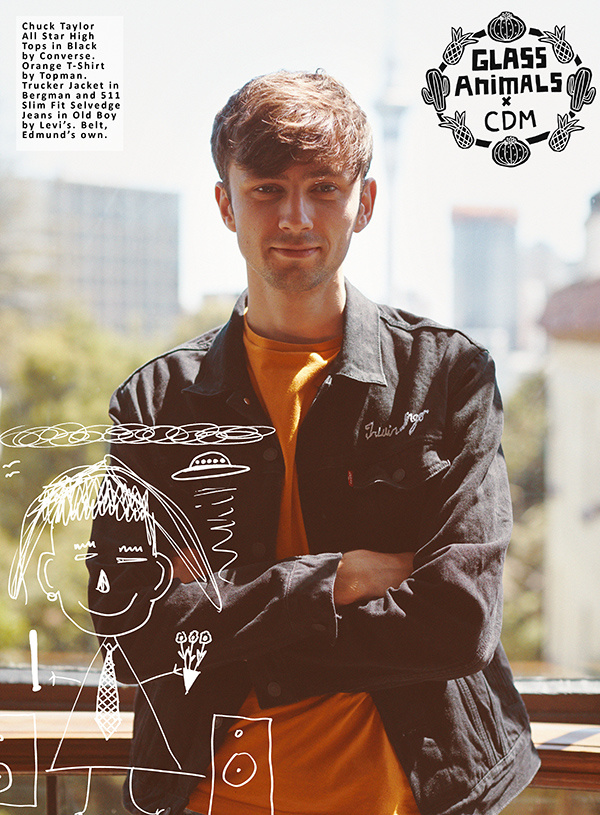
Fittingly, drummer Joe Seaward studied anthropology at university, once telling music blog Stereofox that, "I absolutely loved it, it was fascinating, really really interesting and made me think about things in a completely different way." Seaward is also into 'Stranger Things', an enthusiast of grapes, and his favourite song ever is Radiohead’s 'Reckoner' (with his favourite album being, of course, Radiohead’s 'In Rainbows'). Oftentimes a sardonic foil to Bayley in interviews, Joe today himself falls victim to the band’s wry wit, protesting when Bayley observes that, "Every picture is of a thing that isn’t actually him," after his friends each name their favourite thing about him for a set of themed polaroid photos. A disappointed Seaward says to MacFarlane, "[Are my clothes] really your favourite thing about me?" Drew deflects, saying that it’s like asking him, "What is your favourite thing about life, Drew? There’s so many things, it’s impossible!"
In a 2014 interview with The Pitch magazine, Bayley assigned Aladdin’s Jasmine as Seaward’s Disney Princess counterpart, and also decided that if Joe had to teach a university course, that he would "give one or two lectures a week on 'The Urban Diva' and he’d teach people about streetwear fashion trends." As you’d expect, Seaward sports a lot of Adidas, supports Chelsea Football Club, and his hero is Brazilian footballer Ronaldo Luís Nazário de Lima (whom he recently met at Lollapalooza Brasil). Bonus fact: On Joe’s favourite 'How To Be A Human Being' album-track, 'Mama’s Gun', his father Charlie Seaward plays the flute refrain.
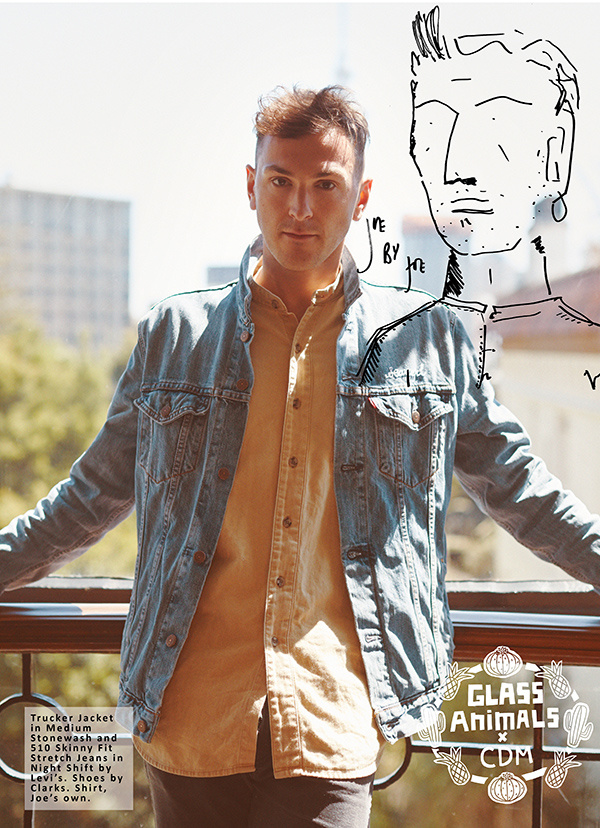
Meanwhile, Dave Bayley is anxious. He’s accidentally broken a perspex sign and is worriedly offering super-glue to try and fix it (which he keeps on-hand in his backpack for sealing over cuts so that his fingers don’t bleed on-stage while playing guitar). 15 minutes later he’ll be ashamedly confessing that he recently used an anti-spy sticker on his laptop camera, as well as pondering the spying capabilities of smart-phones, and rather more sheepishly, confiding that his father is a sea-slug scientist. Two hours prior, Bayley chided me for taking a mysterious second-hand tissue out of his hands that he’d discovered in the pockets of a jacket ("Don’t touch it! Now we both have to wash our hands"), which I suppose, is to be expected of the kind of man who last month outside of a venue in Norwich, personally brought fans in line cups of tea to stay warm.
Bayley keeps his cards held tightly to his chest, but has leisurely been revealing more and more of the 'How To Be A Human Being’ world that he’s created, with his dedication to bringing the characters to life running the gamut from modulating his singing-voice to match a song’s narrator, and to (coincidentally, or not) Bayley’s own signature mirroring the circumpunct symbol secreted away in the mosiac border of the 'How To Be A Human Being' cover-art, alongside other hieroglyphs (such as a rocket, pill, camera, and dollar-sign) that represent tracks on the album. Perhaps most accurately, a comment on YouTube says of Bayley, "This is what it would sound like if a lava lamp could sing." Here’s a human whose aura is no doubt warmly coloured, whose initials just happen to spell out D.A.B., and whose brain is dizzyingly always switched on.

How do you know when a band has made it in New Zealand?
A) When Dads are listening to their singles on the radio.
B) When one of their songs is played during the weather on a late-night news show.
C) When their twilight Laneway Festival set is all anyone can talk about the next day.
And with all of the above achievements now ticked off, Glass Animals can no doubt look forward to a future where when you search their name via Google Image, you may one day no longer happen across any literal interpretations.
WATCH GLASS ANIMALS [ATTEMPT TO] PLAY CARDS AGAINST HUMANITY...
Coup De Main spoke to Glass Animals’ Dave Bayley on the phone back in November of last year, as well as on the day of Laneway Festival in Auckland this year. What follows below is a truncated combination of both conversations for ease of reading...

COUP DE MAIN: Welcome to New Zealand! How has Laneway Festival been treating you so far?
GLASS ANIMALS - DAVE BAYLEY: It’s been really good. I didn’t know what to expect, but it’s been quite crazy. We always have crazy times at festivals here. There was someone crowd-surfing on an inflatable pineapple-dinghy the other day.
CDM: In Australia?
DAVE: Actually that was at Singapore Laneway. And then here it’s been mental as well. People like climbing trees and stuff. It’s brilliant, it’s cool, it’s awesome.
CDM: Have you had time to watch any of the other touring acts yet?
DAVE: I have! I’ve seen quite a few. I saw a bit of D.D Dumbo, that was amazing. I saw Whitney, they were awesome, they’re really great. I saw a little bit of Tame Impala. I saw Mr. Carmack, I thought that was cool. Yeah... lots of stuff. I’m going to try and see a lot more. I haven’t managed to catch Nick Murphy yet. Is NAO playing? I haven’t caught her yet, but I think I’ll probably try and catch some more in Sydney, it’s been hectic.

CDM: Last time we spoke, you recommended that I watch 'Black Mirror'...
DAVE: Did you watch it?
CDM: Yes. Great recommendation, but now I’m emotionally traumatised for life.
DAVE: It’s very close to home isn’t it? It’s weird. That <points at phone camera> is probably looking at your face right now.
CDM: Have you seen the photo of Mark Zuckerberg, where you can see that he’s taped over the camera and mic-jack on his laptop?
DAVE: <whispers> Has he?
CDM: Yeah, threat of unsolicited recording and all that. Apparently you can buy specially designed sticker-sets to cover your laptop camera.
DAVE: Ahhh... I mean... I have one... I do. I go through phases, I had it on for ages, and then last week I took it off. I was like, 'Dave, you’re a fucking idiot. Don’t do that.'
CDM: But once it’s in your head, you can’t stop worrying about it.
DAVE: It seriously gets in your head, yeah. And also, I’m pretty sure that phones listen to you when they’re off and they give you direct advertising based on what they’ve heard, because the new Amazon [Echo] speaker does that. And also if you just say like 'Siri' to your phone, then it will start talking, so it definitely does recognise things. Ugghhh! It’s all very creepy.
CDM: I think the worst thing is knowing that those 'realities' in each episode aren’t really that far off away from the impending future.
DAVE: It’s really scary. You have to be very careful about what you say and do all the time - everyone’s filming you everywhere. There’s no privacy.
CDM: Are there any other TV shows you’re really into at the moment?
DAVE: I’ve been re-watching 'Seinfeld'. 'Seinfeld' is my favourite of all-time, it’s wonderful. That’s my favourite, so I’m re-watching bits of that at the moment.

CDM: All of Glass Animals met in school at the age of 13 right? What were your first impressions of each other?
DAVE: Joe was too cool, he hung out with some of the cool kids at school. And then I went to a music festival with some of my friends from out of school and the friend that he was going with dropped out, so he asked if he could go with me. And we didn’t know each other at all.
CDM: Which festival was it?
DAVE: It was Reading Festival. I think we were 14 at the time, or maybe even younger. We went because Bloc Party were headlining and I was a big Bloc Party fan, and LCD Soundsystem were playing. Those were 'my bands' at the time, when I was 14. Still are - LCD, I love them. So yeah, Joe asked if he could come with me, quite sheepishly, <laughs> and I was like, 'Fuck yeah, alright.' And then we were friends. And then Drew? Where did I meet Drew? I met Drew because when I first went to school I was an American kid, so they introduced me to the other American kid, who was Drew. So we were the American kids.
CDM: Did you live in America because of your parents’ jobs?
DAVE: Yeah, my Dad. I spent a lot of time in Texas. I moved around a bit. My Dad did research and he worked on sea-slugs.
CDM: Explain. Please.
DAVE: He’s a kind of science-guy, and he looks for chemicals that are useful for humans in sea-slugs and some molluscs.
CDM: Why have you not written a song yet about your Dad the Sea-Slug Scientist?
DAVE: Yeah... <chuckles> So I followed him around doing that for a bit, which was cool.

CDM: When did Ed come along?
DAVE: Ed was at school with us, I met him as early as I met the others. He was one of Drew’s really good friends, so we met, and we used to sneak out of school in the middle of the day - and Ed’s house was really near the school, so we’d sneak to Ed’s house and drink and smoke, and then go back to school.
CDM: At what point was Glass Animals born?
DAVE: We never really were like, 'Let’s form a band, let’s do this and make some music.' I wrote some music because I was at university and a bit bored. I was a DJ for a bit. That’s kind of how I started.
CDM: What kind of music? House?
DAVE: It was kind of anything from... yeah, there was a lot of house music. I used to play Four Tet, Joy Orbison; I used to play a lot of that, and Blawan, and all that heavy bass music. I haven’t DJ’d in years, I don’t know if I’m going to do it again. But I used to DJ, and you’d get home from DJ sets and be wired because of the adrenaline and the loud music, so I liked making my own noises because I couldn’t sleep. And then I showed the band that music - well, I showed my friends that music; Ed, Drew, and Joe - and they were like, 'Oh this is cool, you should put it on the Internet.' I was like, 'I’m only going to put it on the Internet if you’re in the band.' And that was it.
MY FAVOURITE THING ABOUT DREW IS...


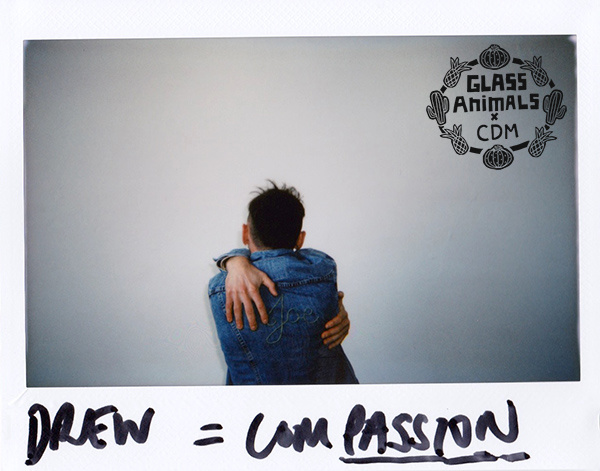
MY FAVOURITE THING ABOUT ED IS...
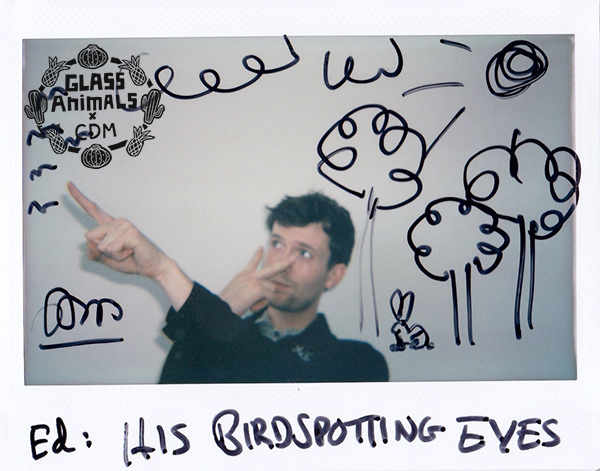

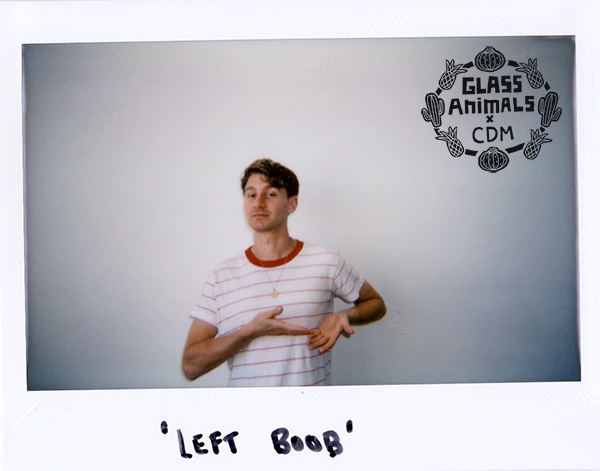
MY FAVOURITE THING ABOUT JOE IS...
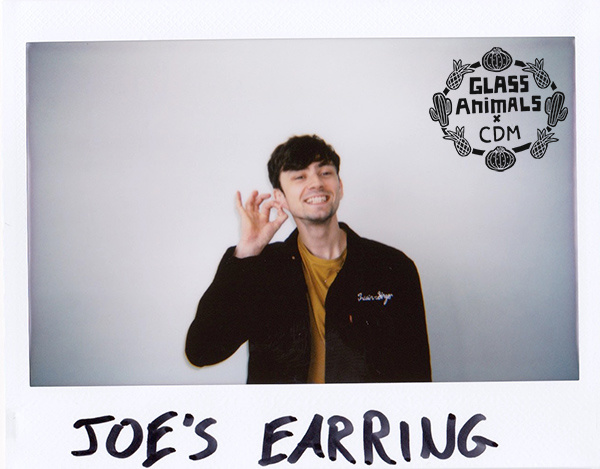
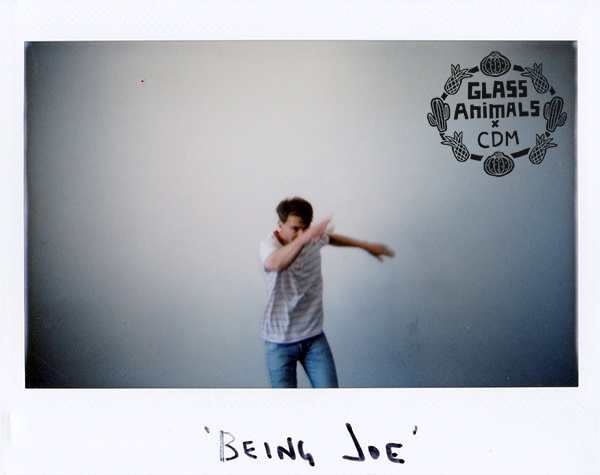

MY FAVOURITE THING ABOUT DAVE IS...



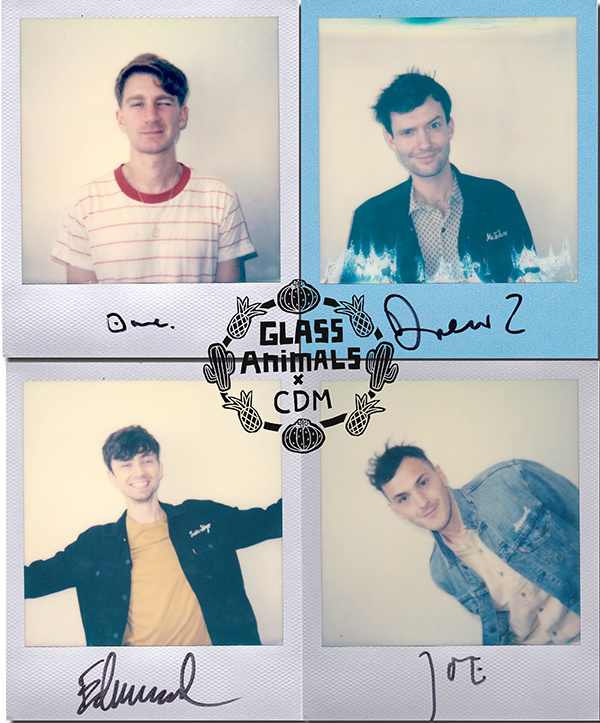
CDM: Is Glass Animals your main priority for the foreseeable future?
DAVE: Yeah, I really like doing it. There’s loads of stuff I’d like to do, and I’ve been doing some other stuff as well that’s been really fun.
CDM: What else have you been doing?
DAVE: I do a bit of writing for other people and some production-work. It’s different, there’s a dividing-line...
CDM: You’re really good at writing hooks. Would you ever consider writing songs for popstars?
DAVE: I’ve been doing a bit of that stuff... Some of it is out there already, I’m not going to tell you what it is. Another one is about to come out that actually has my name on it, that was with a pop-artist. Well, kind of pop? I don’t know if it counts. I can’t tell you.
CDM: Fine. I’ll wait.
DAVE: It won’t be long, it won’t be long.
[FYI, it was Flume’s 'Fantastic'.]

CDM: What is the Glass Animals song-creation process like?
DAVE: It depends. The first album was very different to the new album. The first album was very much me in my bedroom making sounds with synthesisers and on a computer, and then singing over the top of those soundscapes. The new album was the opposite, it was very much me locked in a bedroom with a guitar, just writing. Sometimes starting with words, sometimes starting with chords and words, and starting with the core element and then adding. I’d add some sounds and a general soundscape and maybe a rough drumbeat and some rough synth-lines. I’d make a demo, basically, and then go into the studio with the band. Joe would do some drums - I’m not a very good drummer. I like things to be played live on the record, rather than-- you can always programme something, or you can get someone really good to play it. So those guys are actually much better at all the instruments; I suck at all the instruments, but I can do them really rough and make a demo.
CDM: It’s okay. Your contribution is live-dancing.
DAVE: I do some live-dancing, that’s what I do.
CDM: You’ve said that the synth sound in 'Youth' is a sample of an owl that you made into a synth. How did you do that? Like, how does one even go about making that happen?
DAVE: It’s not hard!!! Step one: Find owl. Step two: Record owl.
CDM: Don’t hurt the owl, though.
DAVE: No, no, you can’t hurt the owl. Step three: Find a good sampler. I have a couple of samplers that I like, there’s some old vintage ones, and some modern ones, and in this case I used a modern one. And you drop the sample into the sampler, and you programme it so it changes pitch over every key. It’s really easy. There are basic versions - Casio make a really small and simple version, it has a microphone in it and you hit record, and you can go like <makes an owl sound> and <sings an owl-scale>.
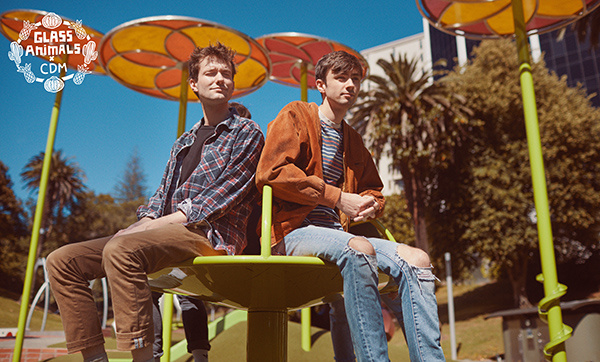
CDM: Your latest album opens with 'Life Itself’ - a characterisation of a dude called Chuck Rogers who has sociopathic tendencies. Do you believe in nature or nurture? Was Chuck born abnormal? Or did society make him abnormal?
DAVE: Ha! I’ve spent many years trying to learn about this stuff when I was at university. It’s a combination of the two, I think. With him, there are hints in the song that definitely hint at it being nurture - he talks about his dad and he talks about his mum and there are little hints about his relationship with them, and it maybe being a bit hard and a bit dysfunctional. So in his case, maybe nurture, but in general, I think it’s a combination of the two.
CDM: Humans have been conditioned to have a herd mentality and to be afraid of loneliness - there’s a social stigma attached to loners and singletons. Is it possible to be happy with just your own company?
DAVE: I think so. I mean, I wish I had more of just my own company. I end up spending pretty much my entire life in a series of buses with twelve other people, so I absolutely think it’s lovely to be on your own and I wish I could do it more. But you need some social interaction, I think. And that’s where that song came into play, 'Life Itself'. A little bit of it was also autobiographical, I was spending a lot of time after that tour just sitting in a room on my own and writing music, and I started to feel a bit weird - when I went out of the studio I felt like everyone was an alien and they didn’t belong there. I almost forgot what other people looked like and what I looked like, it was really strange. So that’s where that song came from.
CDM: The unconditional love that the mother character in 'Youth' shows her son is really touching. What do you think is the most powerful kind of love?
DAVE: My goodness. All love is incredibly powerful. These are deep questions. Love by its very meaning is quite powerful, isn’t it?
CDM: I’ve always thought that it’s the strongest human emotion. Almost everything else is a reaction to love, or the absence of love.
DAVE: Yeah, that’s true. People start wars for love. I don’t know if there’s a certain type of love that’s strongest, but I do think that a mother’s [love] is a definite special thing, the love that mothers have for their children, and that’s what that song is about.
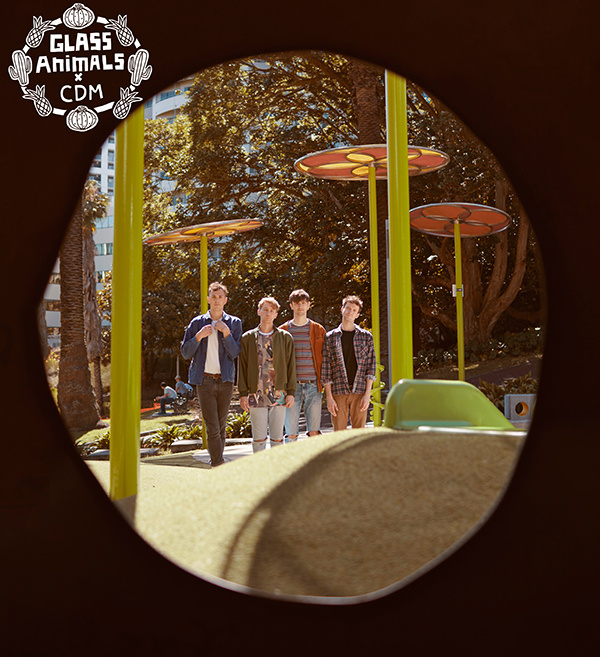
CDM: In contrast, 'Pork Soda' is about the wasting away of love. Why is the preservation and cultivation of love so difficult?
DAVE: Oh my goodness, there's a lot of reasons for it. Some of it is completely unexplainable - sometimes people just fall out of love, sometimes people go through phases, sometimes people, basically, change. The world is changing and people change with it, and I think with that, feelings change and emotions change and the way people feel about each other changes. It’s very, very complex. <laughs> I mean, we can get into a deep philosophical and scientific debate about it if you want, but I think that might be the subject of a kind of encyclopaedia. People have written books on this subject!
CDM: My favourite lyrics on the new album are "with a cookie as a coaster" in 'Season 2 Episode 3'. That line is iconic. What inspired you to write it?
DAVE: Everyone knows someone a bit like the character in that song, and I had one particular house-mate - he used to use a bag of crisps under his beer as a coaster. He never moved, he just sat on the sofa all day every day and just smoked loads of weed, and one day I saw him using a bag of crisps as a coaster. The first thing that occurred to me was, 'My god, he’s putting his beer on a bag of crisps.' And then, 'Why has he even bothered to find something to use as a coaster? Maybe he’s making some kind of effort.' I thought it was just quite ironic that he was making some kind of effort, even though he hadn’t moved in six days he had found something to use as a coaster. That was the inspiration.
CDM: You’ve been vocal about the connection between your song 'Mama's Gun' and Karen Carpenter’s battle against eating disorders, and the avoidance of social dialogues about mental health. Having visited mental hospitals while studying neuroscience, what do you think we can do better to support those suffering from mental illnesses?
DAVE: There’s just so much we can do, but I think the main thing is the huge, as you said, social stigma attached to speaking about it. People know the signs and symptoms of a heart attack - if you see someone holding their chest and falling to the ground, you know that they’re having a heart attack. But the signs and symptoms of someone who might be about to do something awful to themselves are less widely known. People choose not to see that kind of stuff; they don’t see it. And people need to learn to see that kind of stuff and talk about it and talk about how they’re feeling and be quite open about it. Suicide is the number one killer of young people now - I think it’s people under the age of 40. It should be talked about in the social dialogue like a heart attack is, or a stroke is, so people can learn to recognise it and do something about it.
CDM: 'Agnes', I think, is my favourite song you’ve written thus far. It’s so emotive. It’s the kind of song you have to drop everything to fully concentrate and listen to. What was running through your mind while writing it?
DAVE: Lots of things... Yeah, it’s a very sad song and I was trying to pull together everything that I knew about, that referenced death and passing on. There’s load of references to all of my favourite songs about death and books about death, everything, and just trying to pull all of those feelings I had while reading/watching/hearing all of those things into one piece of music.
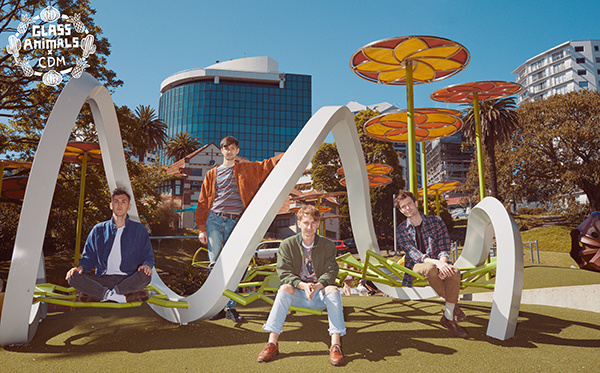
CDM: You made thorough moodboards for each of the new album’s characters when casting the actors and have likened the record to "a collection of short stories". Could you ever see yourself extending the album’s characters further than songs and into actual written short-stories?
DAVE: Yeah it could quite easily turn into some short-stories; I’d like to do it one day. But not quite yet, I need to be older and wiser to write books and short-stories, I think. I’m not there yet.
CDM: What was it like working with Neil Krug on the visuals for this album?
DAVE: Cool! He’s a really good dude. We kind of knew what we wanted, and we wanted a little bit of his aesthetic as well. He’s kind of known more for his colours and things, but I quite like his composition. He’s a good dude, so we kind of collaborated a bit, and he just acted as a very good photographer. We’d set the people up and we’d build the rooms and say to the actors, 'Stand like this. Look like this. This is what’s going through your head.' And then Neil would come in at that point and set the camera up.
CDM: The textured squares around the border of the album cover go into amazing detail, featuring microscopic details relating to the songs. How long did all the album art take you to do?
DAVE: It took ages... I worked a bit with a guy called Mat Cook who is absolutely lovely, and he was pretty helpful with coming up with a lot of the ideas for it. I knew that I wanted the border, and I knew that I wanted the border to have little symbols in it, and he had this idea to scan in lots of our favourite bits of art and chop that up into squares and use that as mosaic tiles, essentially. Mat did a lot of that [scanning], that basic stuff, and then we put it together. He did a rough first version, and then I took the Photoshop file away and did a bit more work on it, and then we worked on it together until we had a huge ridiculous border that took hours. It took ages.
CDM: Do you think this tradition of putting creative effort into the artwork of physical versions of albums needs to be upheld?
DAVE: I do. I think it’s a shame that no-one has album art anymore. It’s just a black-and-white tracklist on your iPhone screen or something, isn’t it?
CDM: Streaming-services feel so impersonal without full artwork to look at. And recently, it was sad that The xx out-sold The Weeknd in actual physical albums in America during the first week of release for their new record, but then lost out on a #1 album due to streaming and 'equivalent album units'.
DAVE: Our streaming numbers are insane compared to sales. But, I like streaming. It’s a solution to what was an absolutely terrible problem - a really bad problem. And the music industry has started making money again because of it, which is wonderful. I know it’s very difficult and there’s still so many problems with streaming, but if you think about when the radio came out for instance, the music industry was in total crisis-mode. No-one bought any fucking records. People went out and bought radios. And the music industry was like, 'What the fuck are we going to do?! It’s done.' Every label going bankrupt. And then people eventually learn how to work with it and labels learn how to use it to their advantage, and the problems are ironed out. They’ll slowly iron out the problems with the charts; I think they’ll slowly iron out a lot of other problems. But overall, I think it’s an amazing thing, streaming. I use all of them, I find. They’re good. There’s still a lot of work that needs to be done, of course, but ultimately it’s a very positive direction. It’s really cool.
CDM: If money was no obstacle, what would your dream production/stage-set look like?
DAVE: Oh wow, we’re working on it. I think, by the end of this tour we might get there, we might get to pretty close. Aside from the elephants, which are proving difficult. Oh! But artwork! We didn’t finish-- I think it’s up to the artist to find a new solution for artwork. No-one’s buying physical copies, so don’t spend shitloads of money on physical artwork - make digital artwork. Make an amazing-- we’re trying to make digital artwork for every song on the record, and there’s an interactive website. I don’t know if people are going to use it or anything, but it’s--
CDM: And you made a game!
DAVE: The ['Season 2 Episode 3'] game is one of those websites. So right now there’s three working, and the fourth one ['Pork Soda'] is about to come out.
CDM: Are you going to keep the Chuck Rogers ['Life Itself'] website online after the album campaign ends?
DAVE: Forever! It’s a skeleton that’s there forever, and it’s free. It’s up to the artist to find a way to use new technology in an interesting way.
MY FAVOURITE 'HOW TO BE A HUMAN BEING' SONG IS....


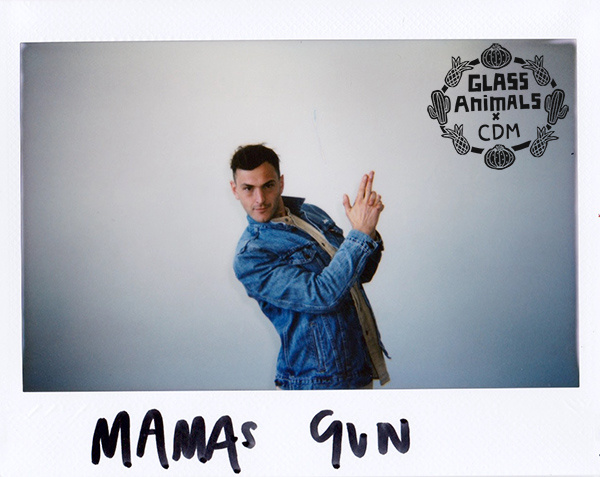
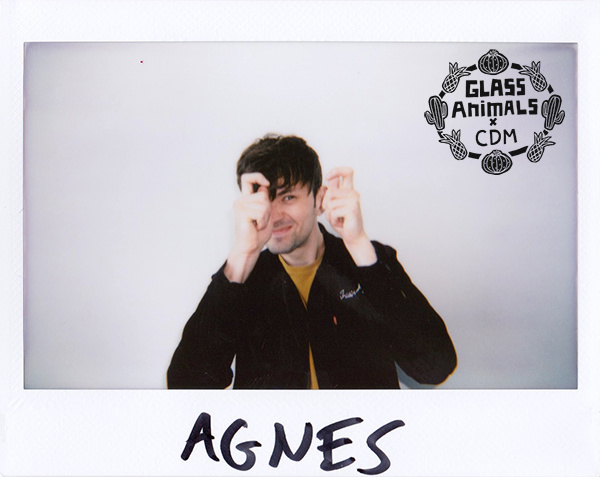

CDM: Have you started writing any music for your next album yet?
DAVE: There’s always stuff happening, but I’m not sure it’s for the next album or anything. We’re working on a lot at the moment, that’s going to keep us very, very busy. There’s some collaborations in the pipeline, there’s alternate versions of some stuff that’s come out-- I shouldn’t say too much. It’s going to be a busy next couple of months with lots happening. I’m not sure of anything for the new record yet, but you never know, there’s always nuggets being made.
CDM: And you’ll come back to New Zealand for your own headlining show, right?
DAVE: Definitely! I hope so.
CDM: I need to see 'Agnes' live.
DAVE: Really?
CDM: Yes, it’s on my bucket-list.
DAVE: Ohhh... I don’t know if we’re going to play it today, we’ll see what happens. We haven’t been doing it at festival shows.
CDM: The vibe might not be right. Everyone might start crying. Hence why you must return.
DAVE: I know, right? We did it at a festival, and it went well but <laughs> the crowd afterwards, people cheered and were like, 'Yeah!' It was a big cheer and then just silence, everyone was just standing there. It was the last song, 'Alright, bye. Thanks so much everyone,' and then the whole crowd just stood for a bit. It was so weird!
CDM: Do you think pop music is getting more interesting or more basic?
DAVE: I think there are areas of it that are getting really interesting. There’s always people pushing pop music forwards. Kind of maybe now more than ever.
CDM: Any favourites in particular?
DAVE: Kanye is always, always pushing for me, in a good way. He’s always doing interesting things, finding new producers and finding new sounds, and I do love the new record. Who else? I quite like the new Rihanna record. Do you like it? Have you heard it?
CDM: Low-key into it, but I’m not a huge RiRi obsessive--
DAVE: Me neither.
CDM: I think I’m still burnt from the last time I saw her live. She was like an hour late on-stage.
DAVE: Oh god, really? That’s not cool.
CDM: But I like the Tame Impala cover.
DAVE: That’s cool. I mean, it is the Tame Impala song with her singing on it.
CDM: Tame Impala karaoke, but awesome for Kevin Parker.
DAVE: Yeah! It’s great. The record is really cool. It’s interesting. If you kinda strip away a lot of the very pop-y production, it’s quite interesting songwriting a lot of the time, which is cool. Who else is doing interesting stuff? There’s maybe a trap overload at the moment. Still! Who else? I’m trying to think of who else has been in the charts and been doing really good pop music. I’m definitely missing some...
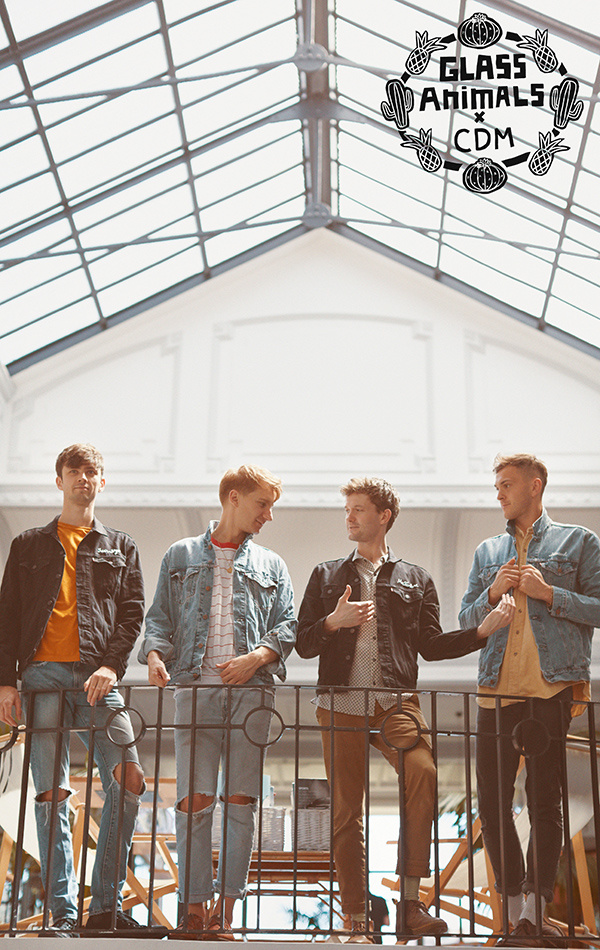
CDM: Would Kanye be your dream collab?
DAVE: I don’t know if I’d collaborate with him. [Need to] meet him first. I don’t know much about him... I don’t read 'Heat' magazine or anything.
CDM: What! You mean you don’t keep up with The Kardashians?
DAVE: <sarcastically> Do you?! Yes, I find it a bit weird learning too much about people’s lives.
CDM: I like the mystery of not knowing everything that The Beatles did in the 60s.
DAVE: You hear the stories that trickle out, but--
CDM: And that makes them more exciting!
DAVE: Exactly. But you don’t see photos of them at the beach on their holidays.
CDM: How do you straddle the line between wanting to keep your fans updated on e.g. Snapchat? But also your private life, private?
DAVE: I don’t do the Snapchat, I let Drew do it. That’s one of the ways.
CDM: Do you do any of the band’s social media?
DAVE: I do Instagram. I like social media in general, I think it’s fine, and I do all the rest of them, but not Snapchat. Snapchat’s very time-consuming, and I haven’t managed to fit it into my life yet. I might do. One day. You just have to turn your phone off once in a while. When I go to the studio, I just turn my phone off, and that definitely helps. That’s the only way to find a balance really, isn’t it? Just turn your phone off sometimes.
Click here to read the rest of CDM Issue #20.



Glass Animals’ latest album 'How To Be A Human Being' is out now - click here to purchase.
Watch the 'Pork Soda' music video below...

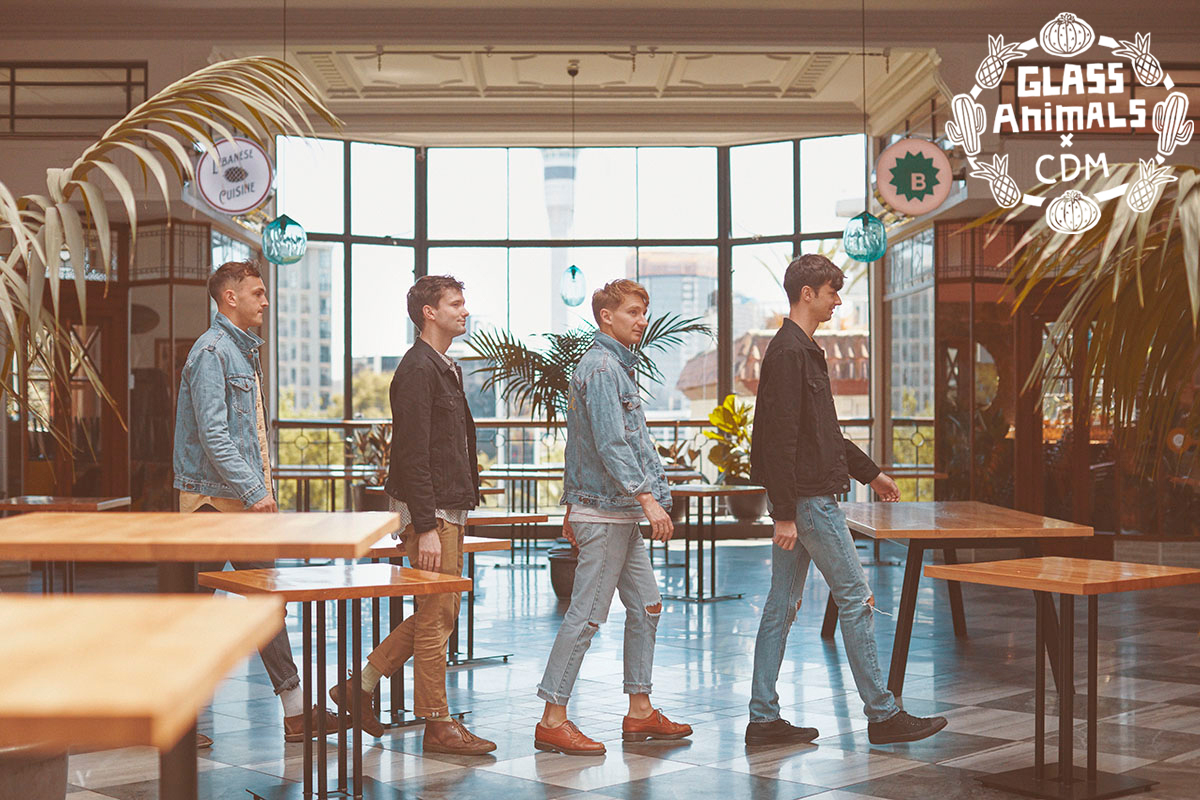
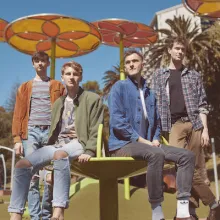 Glass Animals
Glass Animals